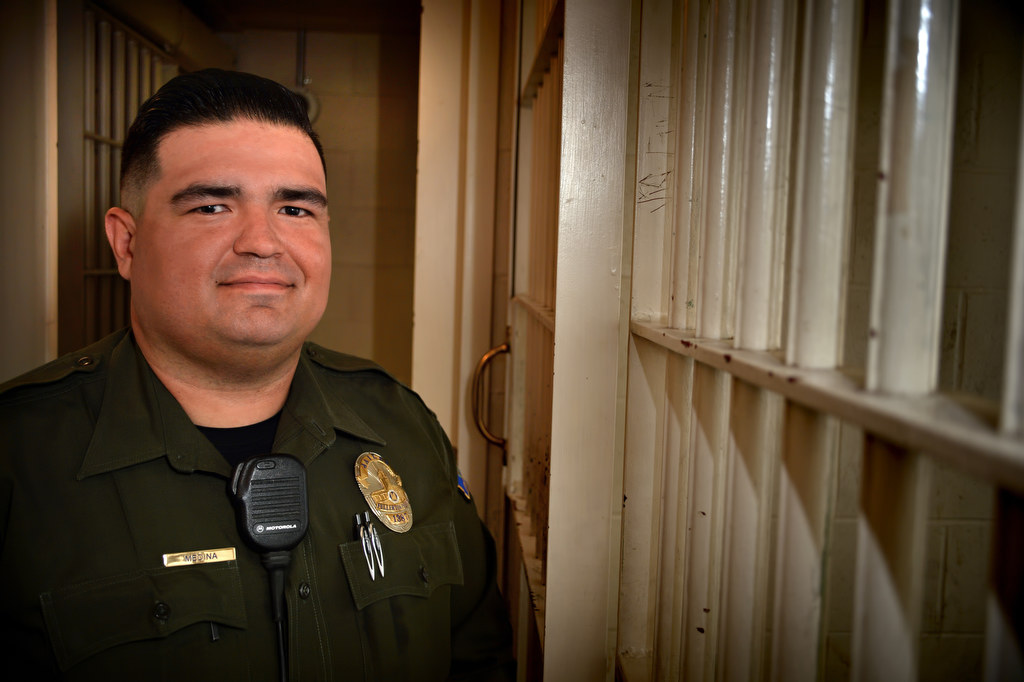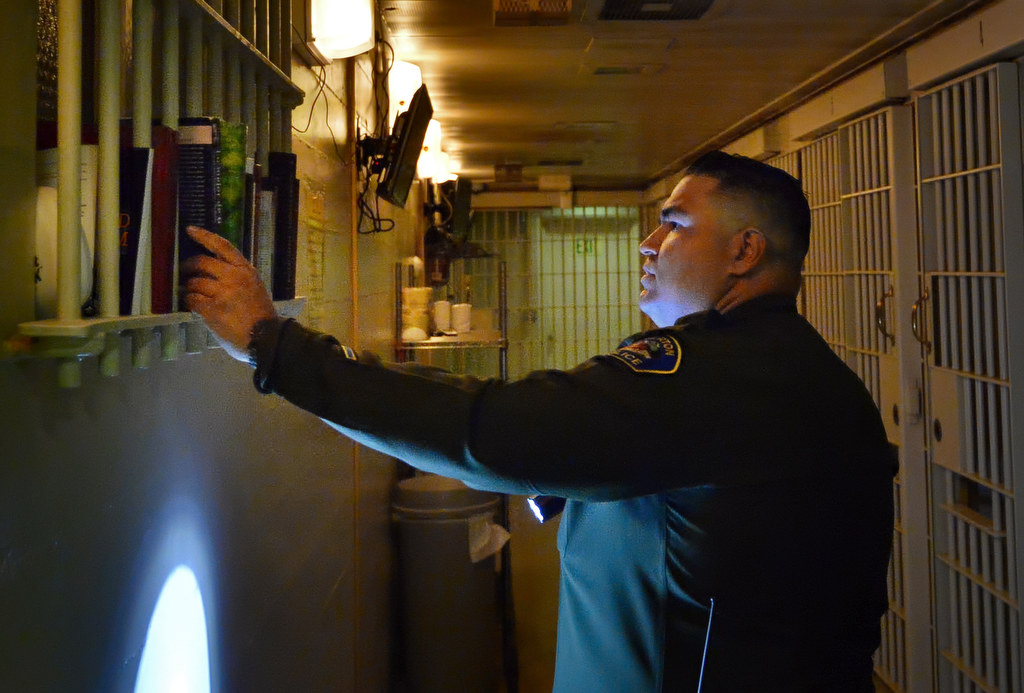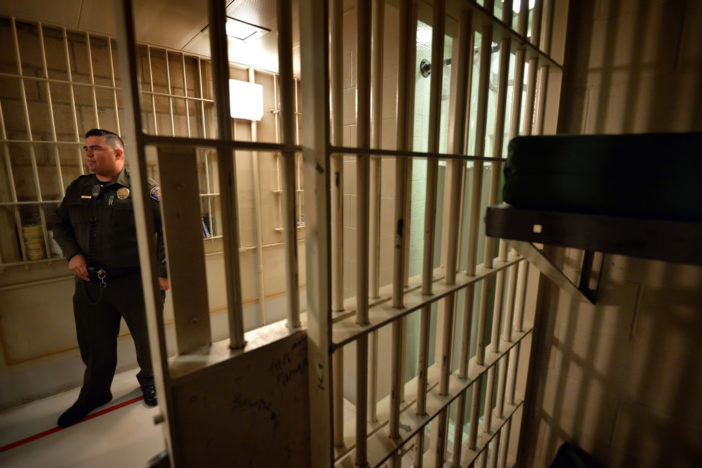He’s had every conceivable bodily fluid end up on his black shoes or forest-green uniform at one time or another, but Fullerton PD jailer Carlos Medina takes that highly unpleasant reality in stride.
“It’s not personal,” says Medina. “They (arrestees) don’t know me. If I took everything personally, I would be miserable and angry at the world.”
Medina, 28, is a personable and grounded guy — despite a job that puts him in regular close contact with some of society’s most unsavory characters.
Drunks.
Drug dealers.
Wife beaters.
All of them feeling, when they see him, quite literally, caged — and most not thrilled with that fact.
“I love it,” Medina says of his job. “It’s fun. It’s different. Not a lot of people can say they do what I do. Things I see on a nightly basis most people probably won’t ever see.”
Medina, who grew up in a close Catholic family in Inglewood, sees his job as more than simply putting people in the slammer.
“I see this as my way of helping people,” says Medina, a former cadet at the Fullerton PD who applied to be a jailer because there was a job opening — and who has grown to love it in his three years in the civilian position (jailers aren’t sworn officers).

Carlos Medina views part of his job as a jailer as helping people out.
Photo by Steven Georges/Behind the Badge OC
“There are people who end up in here who are lost, and sometimes they just want someone to listen to,” Medina says. “I take five minutes out of my day to sit down and talk to them, and that helps.”
***
Medina recently gave a tour of the Fullerton City Jail, which is part of Police Department HQs on Commonwealth Avenue, to Behind the Badge OC.
That night, he was paired up with Corp. Robert Kirk, an FPD patrol officer who got jailer experience when he was a deputy with the Riverside County Sheriff’s Department. Kirk, one of the FPD’s few officers who are state-qualified to work in the jail, was filling in for regular jailer Rene Valdes.
It was just after 9 on a Thursday night — too early for the usual round of drunks and other late-night miscreants to be in the pokey.
There was a man in one of the four holding cells on the first floor of the jail. He was a suspect in a domestic violence incident who was cooling his heels as the arresting officer worked on the investigation.
Upstairs, there were five inmates in a cellblock that holds eight people, and one “trustee” — the term used for an inmate in the FPD’s “pay-to-stay” program (more on that in a minute).
Upstairs, there is room for 16 inmates in housing cells. The five inmates on this night were being held on suspicion of such garden-variety crimes as having an outstanding warrant and possession of drugs for sale.
Medina plucked a book from a shelf facing the cellblock for eight inmates.
Not surprisingly, it was a Bible. Most of the books are religious. But there are a few mainstream fiction titles.
“Open House,” by William Katz.
“Telegraph Days,” by Larry McMurtry.
“Guilty as Sin,” by Tammy Hoag.
Medina got a chuckle out of that last one.

Medina plucks a book off a shelf in a cellblock for eight people.
Photo by Steven Georges/Behind the Badge OC
When arresting officers roll up with a suspect in the back of a black-and-white, they typically take out the computers in their units to complete an inmate information form they then electronically send to the jailers.
Outside the jail but behind a secure gate while officers complete the info form, inmates sometimes are cuffed to a bench next to lockers where their belongings are stored.
Before officers punch a button to be beeped into the jail with their suspect, they store their gun in a locker. No weapons are allowed in the jail, for obvious reasons.
And before entering the jail, suspects have to read an admonishment that if they knowingly bring inside a controlled substance they could be charged with a felony.
Once inside the jail, Medina asks detailed medical questions to an arrestee to make sure he or she is fit to be temporarily housed there. Any suspect who needs immediate medical attention or who has a serious medical condition has to be transported to the Orange County Jail or to a hospital; the Fullerton City Jail doesn’t have medical staff.
Inmates then are thoroughly searched and relieved of all personal property down to the penny. The only thing they are allowed to have is glasses if they need them to see. Their booking number serves as a pin number for them to make three 5-minute local calls. Inmates who need to arrange childcare are given five phone calls. Calls beyond that are charged collect.
Inmates then have a booking photo taken — one a face shot, the second a profile.
“Look at the camera,” Medina will tell them.
Some ask him if they should smile.
“I tell them, ‘It’s your booking photo,” Medina says.
***
The Fullerton PD is one of a handful of O.C. police agencies that offer a “pay-to-stay” jail option for non-violent offenders who want to avoid staying at the county jail — a whole different world than a city jail.
The cost is $127 a day, and the money has to be paid in full up front. Asked if there are any discounts for long stretches, Medina laughed.
That $127 will get you a room with a TV and workout privileges (shooting hoops outside in a secure area). And you may have to share your room with a fellow “trustee” whose duties include washing blankets and sheets for all the jail inmates.
When there are no trustees at the jail, Medina or his partner has laundry duty.
Inmates are served two hot meals a day in addition to breakfast, which is served at 5:30 a.m. Lunch is at noon at dinner is at 5:30 p.m.
The cuisine isn’t exciting — a charbroiled beef patty or smoked sausage for lunch, roasted turkey with mashed potatoes for dinner.
The food is prepackaged and heated at 350 degrees for 30 minutes. Salt and pepper are the only available condiments. Nope, hot sauce isn’t available.
Juice and milk are the beverage options. And each meal comes with a bag of chips and two cookies.
Jail, in short, is no picnic — gourmet or otherwise.
And sometimes, for Medina, jail can be dangerous. He recently spent a week off work after getting injured in a tussle with a highly intoxicated individual who took issue with being behind bars. Medina hurt his leg and hand but is OK.
The tussle was a rarity.
The Fullerton PD makes every effort to keep its jail as safe as possible for its jailers as well as for the inmates, with cameras monitoring cellblocks and an intercom system used to issue commands arrestees who get out of line. Jailers make visual checks of the cells every hour.
Medina, who has a girlfriend and who coaches high school football and enjoys movies, says he emphasizes while working “verbal judo,” the art of talking an inmate down to avoid using physical force.
Like all jailers, he’s trained in arrest-and-control techniques as part of a state-certified 200-hour course that essentially is a condensed version of a police academy.
Medina, who has studied criminal justice at Cal State Fullerton, says he may aspire to become an officer just like his older sister, a cop with the Inglewood PD.
For now, though, he’s enjoying his behind-the-scenes job at the Fullerton PD — someone who loves what they do and who never takes anything personally.
“If I take this job home with me,” Medina says, “it’s going to eat at me like you won’t believe. I leave my work stuff at work, and my home stuff at home.”
 Behind the Badge
Behind the Badge



